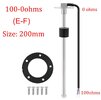stuwindsurf
New Member
Hi all,
After some help please!
I have a motorcycle dash that has a built in fuel gauge. According to the manual the fuel gauge needs a sender of either 100/250/510 ohms To give a correct reading. The dash shows full at 0 ohms and empty at either 100/250/510 ohms (selectable).
I have found a suitable sender, fitment wise, for the custom tank I am making but it is only available in either 0 - 190 ohms or 240 - 33 ohms. Is there a certain value resister or other component I could use to make this work with the dash?....
Thanks in advance for any help!
Stu
After some help please!
I have a motorcycle dash that has a built in fuel gauge. According to the manual the fuel gauge needs a sender of either 100/250/510 ohms To give a correct reading. The dash shows full at 0 ohms and empty at either 100/250/510 ohms (selectable).
I have found a suitable sender, fitment wise, for the custom tank I am making but it is only available in either 0 - 190 ohms or 240 - 33 ohms. Is there a certain value resister or other component I could use to make this work with the dash?....
Thanks in advance for any help!
Stu
Last edited:

